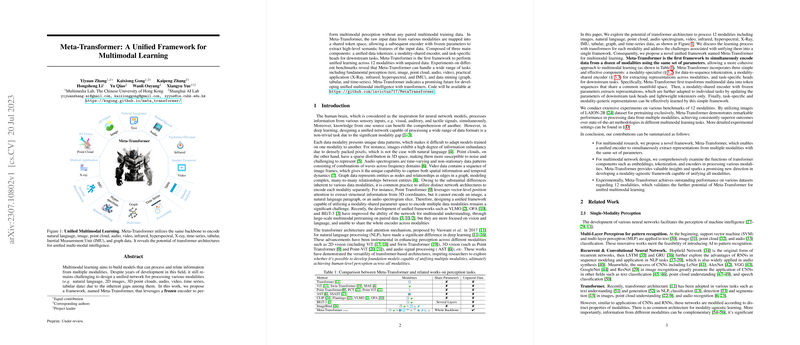Introduction
The integration of multimodal data—ranging from natural language and 2D imagery to more complex forms like 3D point clouds and auditory information—presents a significant challenge in the development of comprehensive machine learning models. Such integration is crucial for creating systems that emulate human-level comprehension across various sensory inputs. Traditionally, architectures are tailored to specific modalities, due to the intrinsic differences that exist between data types. This paper introduces "Meta-Transformer," a novel paradigm that advances the field by providing a unified framework capable of multimodal learning across a diverse set of domains.
Unified Framework for Multimodal Learning
The core proposition of Meta-Transformer is a common parameter space, leveraging a transformer encoder with frozen parameters to process and extract semantic features from multimodal data without the need for paired training. This approach comprises three key components: a unified data tokenizer, modality-shared encoder, and tailored task-specific heads for downstream applications. The Meta-Transformer framework is notable for its ability to consistently encode 12 distinct data modalities, enabling a cohesive multimodal learning strategy.
Task-Specific Adaptation and Results
Functionality is determined through the comprehensively designed task-specific heads, which are adapted to tasks such as text classification, image segmentation, or audio recognition, to name a few. Experiments across various benchmarks exhibit the framework's broad applicability, where Meta-Transformer showcases proficiency in perception tasks, extending to practical applications in X-ray, infrared and hyperspectral imaging, IMU data analysis, as well as data mining tasks involving graphs and time-series. Notably, the framework demonstrates improved performances on a myriad of datasets, signaling a promising step towards unified models for multimodality.
Ongoing Challenges and Future Work
Despite its potential, Meta-Transformer faces challenges akin to any landmark framework. One key limitation is the framework's reduced effectiveness in capturing temporal and structural data elements that are critical for video understanding and graph representation. This underscores a potential lack of temporal and structural awareness within the current architecture. Moreover, to date, Meta-Transformer's prowess in multimodal generation remains unexplored and undefined, leaving ample space for innovation and research.
Conclusion
Meta-Transformer presents an exhilarating development within AI—exemplifying the shift towards harmonizing multimodality through shared encoding frameworks. It subtly reshapes the discussion around neural network design, moving from specificity to generality in learning across disparate datascape. As the industry gazes towards evolving AI capabilities, Meta-Transformer could redefine current pathways, offering a canvas for future generative explorations, and reasserting the indispensable role of transformers in the progression of artificial intelligence.
